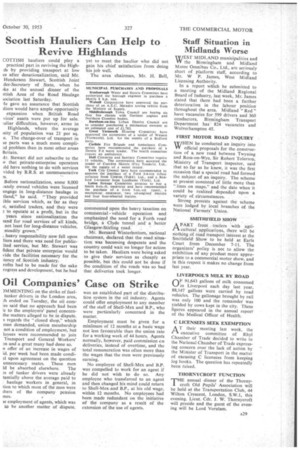Scottish Hauliers Can Help to Revive Highlands
Page 31

If you've noticed an error in this article please click here to report it so we can fix it.
COTTISH hauliers could play a practical part in reviving the Highds by providing transport at low es after denationalization, said Mr. Henderson Stewart, Scottish Joint der-Secretary of State, when he Ike at the annual dinner of the Atish Area of the Road Haulage ;ociation last Saturday.
le gave an assurance that Scottish iliers would have ample opportunity expansion when British Road vices' assets were put up for sale. alliar difficulties, however, arose in Highlands, where the average isity of population was 21 per sq. e. The change-over of transport in se parts was a much more complixl problem than in most other areas Britain.
4r. Stewart did not subscribe to the Al that private-enterprise operators 1.1d have nothing to do with services vided by B.R.S. at unremunerative
Before nationalization, some 8,000 7ately owned vehicles were licensed engage in long-distance haulage in tland," he said. "They provided ible services which, as 'far as they it, satisfied traders, and they were to operate at a profit, but in the years since nationalization the land for road services of all kinds, not least for long-distance vehicles, steadily grown."
heavy responsibility now fell upon hers and there was need for publicited service, but Mr. Stewart was adent that private enterprise would vide the facilities necessary for the iency of Scottish industry.
rofits had to be made for the sake rogress and development, but he had yet to meet the haulier who did not gain his chief satisfaction from doing his job well.
The area chairman, Mr. H. Bell, commented upon the heavy taxation on commercial vehicle operation and emphasized the need for a Forth road bridge, a Clyde tunnel and a better Glasgow-Stirling road.
Mr. Bernard Winterbottotn, national chairman, declared that the road situation was becoming desperate and the country could wait no longer for action to be taken. Hauliers were being asked to give their services as cheaply as possible, but this could not be done if the condition of the roads was so bad that deliveries took longer.




















































































